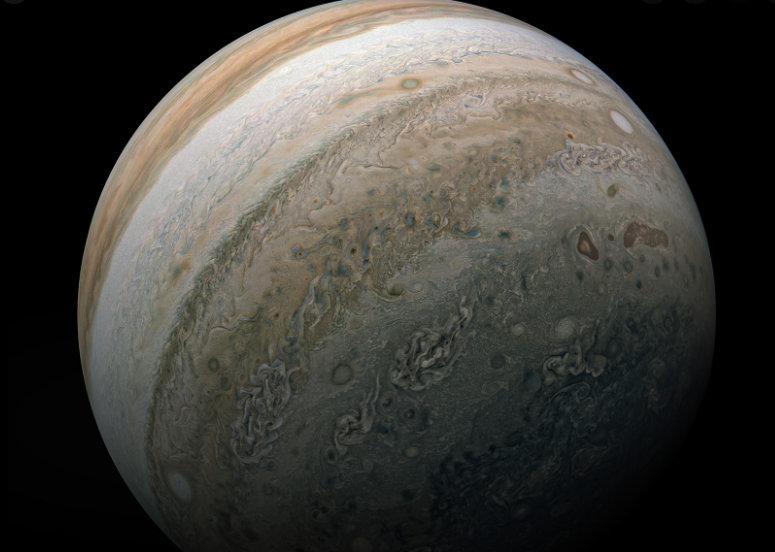According to a new study, life can also thrive in a 100% hydrogen environment. This discovery could completely change our understanding of how (and where) life exists in the universe and provide a new perspective for exploring life in the universe.

"I want astronomers to think more deeply about what kind of planet might be habitable."
NASA's Juno probe captured this sight in Jupiter's southern hemisphere on February 17, 2020. Jupiter has a hydrogen-rich atmosphere, so researchers don't think there will be life on Jupiter; but a new study suggests that life can survive in an atmosphere of pure hydrogen.
(Photo: NASA/Jet Propulsion Laboratory- California Institute of Technology/Southwest Research Institute/MSSS/Kevin M. Gill, CC BY)
According to a new survey, life can thrive in an atmosphere of 100 percent hydrogen. This discovery could revolutionize our understanding of how (and where) life lives. For the survey, a team of researchers led by Sarah Siegel, an astrophysicist at MIT and planetary scientist, conducted experiments on E. coli (a simple prokaryote) and yeast (a more complex eukaryote). They put these species in an environment of 100% pure hydrogen, and incredibly, the microbes survived, showing how life can survive in extreme atmospheric environments. (Paradoxically, hydrogen is less than one part per million in Earth's atmospheric environment dominated by nitrogen.) )
"I want astronomers to think more deeply about what kind of planet might be habitable," Siegel told space-based reporters by email, "and if biologists had ever considered a hydrogen-rich atmospheric environment, they would think it's normal for life to survive in hydrogen; because hydrogen is non-toxic to living things." She said. But, she emphasizes, "astronomers don't realize that life can survive in a hydrogen-dominated environment, so our experiment is all about giving a concise and clear proof that this is the case." ”
Next, Siegel explains, her team might consider studying exoplanets — that is, extrasolar planets — but they won't target the search for alien worlds that could have life. In addition, because hydrogen-rich environments are usually broader and larger from the appearance of planets, they will be easier to observe with observation techniques from Earth, she added.
Explore the microscopic world
The microbes that Siegel and her team study in the lab grow more slowly in a 100 percent pure hydrogen environment than they do in a "normal" Earth's atmosphere. "E. coli grows a few times slower, while yeast grows hundreds of times slower," she says.
While the experiment showed how life could survive in an air-rich hydrogen environment, scientists had no hope of finding exoplanets with 100 percent hydrogen-pure atmospheres. Still, they hope to find some exoplanets where hydrogen makes up the bulk of the atmosphere, Siegel said.
"We haven't found any planets like that yet," Siegel said, "theoretically they should exist... However, Jupiter, Saturn, Uranus, Neptune, giant exoplanets, and "mini-Neptunes" all have atmospheres where H2 (hydrogen) and He (helium) are the main components – although no one would think there would be life there. ”
Look up at the brilliant starry sky
The findings are particularly important for the exploration of extraterrestrial life because, while astronomers have yet to discover extraterrestrial life, they suspect there could be large rocky exoplanets with very thin atmospheres and rich in hydrogen, Siegel said.
Looking ahead to future research, we now know that life can survive in hydrogen, which means that researchers can expand their horizons to study exoplanets and their atmospheres farther afield. These studies could change the perspective of researchers, allowing them to use existing techniques to search for exoplanets that might have been overlooked before. In addition, when observation tools like NASA's James Webb Space Telescope are launched into space (the James Webb Space Telescope is currently scheduled to launch on December 22, 2021), researchers will have better observation conditions.
BY: Chelsea Gohd
FY: Twenty-five Joe
If there is any infringement of the relevant content, please contact the author to delete it after the work is published
Please also obtain authorization to reprint, and pay attention to maintaining completeness and indicating source